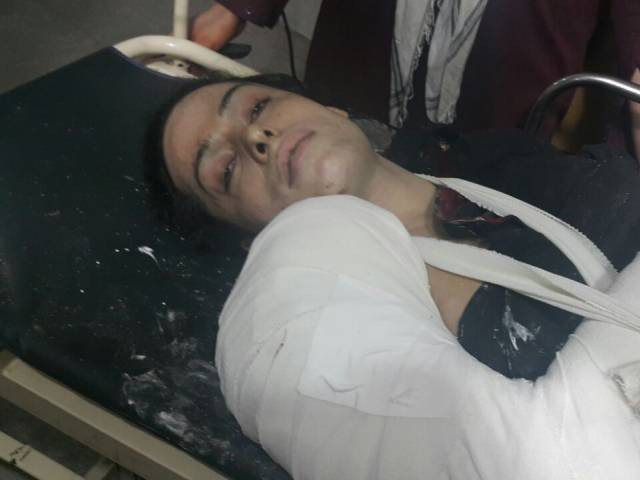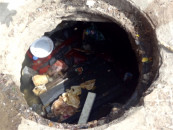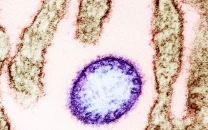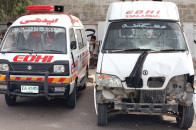No hospital big enough for transgender people
Death of activist Alisha in Peshawar hospital sparks debate over equal rights to healthcare

Death of activist Alisha in Peshawar hospital sparks debate over equal rights to healthcare. PHOTO: FACEBOOK
A transgender tragedy
Shot seven times and in immediate need of medical aid, it seems, was not enough for doctors and nurses to keep their prejudices aside and help dying Alisha. Losing blood with every passing moment, the injured transgender woman was cruelly reminded of her identity and the cost it comes with. Qamar Naseem, a member of rights group Trans Action KP, says a nurse would not come and check Alisha’s bullet wounds despite several requests. Her only excuse was: She is a hijra. “This female nurse had no qualms tending to male patients in the hospital. On our insistence, she again refused saying Alisha must be diseased and filthy. I reminded her that she works at a hospital and it is a place where sick people come,” Naseem says.
In critical condition, Alisha should have been admitted to a ward without delay but refusal to accept her stated gender meant she was kept waiting while the hospital staff decided whether to put her in a male or female ward. Naseem painfully shares how someone during a TV show suggested Alisha should have been first taken to a urologist to confirm her sex and then shifted to the appropriate ward.
‘End discrimination against transgender people’
Alisha’s death shocked many in Pakistan and abroad but it should not come as a surprise that a community that is humiliated in the streets of this country met the same fate in its hospitals and clinics. A place where doctors interact with people who are in their most vulnerable state, Naseem says transgender persons are asked if their breasts are real, if they were enlarged through hormonal treatment and what are their charges per night?
With not even an ounce of compassion to spare for Alisha, Chairperson of Human Rights Commission of Pakistan (HRCP) Zohra Yusuf says the Lady Reading Hospital (LRH) example is a manifestation of prejudices our society holds against transgender people. “Alisha’s case gained prominence because the doctors’ negligence resulted in her death but it is not the first time a transgender person has been denied their right. Such incidents happen across the country because the community is stigmatised everywhere,” she says.
Yusuf laments that biases against them are found at all levels of our society and people who can bring a change avoid getting involved. “There is no interest in learning about the problems faced by the transgender community and addressing them,” she says.
Law of the land
In Pakistan, transgender people are the new women – the law gives them rights, but they are still discriminated against. Human rights lawyer Faisal Siddiqi says the law is very clear about it: There cannot be any sex-based discrimination. “Healthcare cannot be denied even to non-citizens; transgender people are equal citizens of this country such as everyone else, so it is out of question. You can refuse treatment to someone for non-payment of fees or adjust treatment if the patient is a threat to others but cannot decline otherwise,” he explains.
Transgender activist succumbs to injuries after being shot multiple times in Peshawar
Siddiqi says Alisha’s case was of criminal negligence and clearly violates the constitution. “Article 25 explicitly states that sex-based discrimination is prohibited. The writers of the law may or may not have had transgender people in mind when writing it but the terms used provide equal rights to them,” the lawyer says.
Despite having law on their side, transgender people have a long bumpy road ahead. Siddiqi says the problem is not whether our law gives enough rights or not, but of the enforcement of that law. “You cannot give anyone their rights by writing them on a piece of paper; they have to be ensured. And history tells us that rights are only enforced when people mobilise and resist the violation, and when there are strong and functioning state institutions to enforce them,” he asserts. And with Supreme Court’s historic verdict which ordered National Database and Regulatory Authority to issue Computerised National Identity Cards to transgender people, the community has been mobilising and resisting discrimination, Siddiqi says.
Medical ethics
“... I will remember... that warmth, sympathy, and understanding may outweigh the surgeon's knife or the chemist's drug... I [will] tread with care in matters of life and death. Above all, I must not play at God...” One would assume that the Hippocratic Oath doctors take in their declaration to serve humans equally would guide them away from differentiating between sexes but Alisha’s case is an ugly reminder of how even the practitioners of this noble profession are not above bigotry. The expert knowledge they gain during all the years of their medical training give them a unique power over those they treat, and the advice they give or decline to give determines how and if a person receives treatment for their illness.
With the medical community shutting its doors to transgender people they are left to fend for themselves. Dr Syed Imran Murtaza, medical superintendent at Lahore’s Fountain House Institute for Mental Health, says how doctors and other healthcare staff treat transgender people in hospitals is not a unique issue linked to the medical fraternity, but a reflection of our society. “We as a whole do not count them as equals and are insensitive to their needs. We are a pathological society which can feed and sleep with dogs but cannot treat a transgender person with dignity. This is not a problem of our hospitals which refuse to treat them; it is a problem of our society,” he says.
Dr Murtaza, who has worked with transgender people as part of Fountain House’s special initiative to rehabilitate the discriminated community, shares their stories of hunger, humiliation and hurt and says all members of society are answerable for their miseries. “Do we ever stop and think what happens to them when they grow old? Where do they go, how they live, how they deal with all the problems that are part and parcel of old age, how they die and where they are buried? Improving their situation is out of question when we do not even discuss their problems,” he laments.
Way forward
Alisha was vocal in her death as she was during her lifetime, and her departure from this world may be the catalyst for ending unequal treatment of transgender people. Trans Action KP’s Naseem says, following the outcry, health authorities in the province issued show cause notice to LRH and are deliberating on creating a separate ward for transgender people at the hospital as well as a trauma centre. “All these measures are good but transgender people do not live in Peshawar alone. Also, it is not necessary that they will go to a hospital only when shot; they have other medical needs too. What about those?” he asks.
To stress his point, Naseem says majority of the transgender people he knows are sex workers and HIV is common among them. “Our alliance got 35 transgender people tested for HIV and 18 of them were positive; that is how high the number is,” he shares, arguing that even if one big city provides adequate health facilities to transgender people, it will not be enough because members of this marginalised community live across the province and cannot easily travel from far off areas. “These people are daily wage earners and their incomes are minimal; such an arrangement is troubling and not a permanent solution,” he states.
Looking at the bigger picture, Naseem says the problem is the criminalisation of transgender people as reflected in the society’s attitude towards them. “Our society blames them for their miseries. If a transgender person is shot or is HIV positive, people blame them for the choices they made,” he explains.
The activist says even if there is a separate ward for transgender people – though it is widely considered undesirable by the community – and the medical staff is sensitive to their needs, the patient will still be harassed on the way to hospital. “Our friend Arzoo, who is the only transgender government official in the entire province, says she never had any problem at her workplace but reaching office from home is an everyday struggle,” Naseem shares.
Transgender activist critically injured after being shot multiple times in Peshawar
Calling for a change in mindsets, the Trans Action KP official says there is an urgent need to ensure access to healthcare as well to end the stigmatisation and harassment of transgender persons. “If we look at our health systems, its policies and the SOPs in place, there is no mention of the term ‘transgender’. This shows they are not even considered in the protocol,” he says.
In agreement, HRCP’s Yusuf says to tackle this problem, the government should sensitise all our hospitals and make it compulsory for them to provide equal treatment to all patients irrespective of their gender. “As a human and citizen of this country, healthcare is their basic right,” she stresses.
Many have died in the past and many more continue to suffer but Alisha’s death may be our society’s chance at redemption as it is the right time to address this big challenge, Naseem says.
From Khyber to Karachi
Alisha died in Peshawar, laying bare the toxicity of ideas we believe in as a society. In an attempt to get a snapshot of what it is like for transgender people to visit a hospital we speak to activists from different cities and ask them to share their experiences.
Islamabad
Going to a hospital for your own check-up or accompanying another patient is equally humiliating. We shy from going to the doctor and speaking about the changes our bodies go through because of how we are treated.
The stigmatisation of transgender people has forced us to go to dubious doctors, compounders and drugstore owners for medical help instead of specialists. As a result, we take medicines and undergo surgeries without proper consultation and suffer serious consequences.
Transgender people are their own doctors, diagnosing and treating themselves at great risk.
The government should train doctors, nurses and all other staff on how to treat transgender people. If the hospital environment is welcoming, transgender people will come forward with their problems. Those who insist we should have separate wards or doctors should know we are equal citizens and we should be taken to the general ward such as everyone else.
Kashish Nadeem, make-up artist and president of Forum for Dignity Initiatives
Quetta
At hospitals, we are not treated equally; we are laughed at, tossed from one room to another and kept waiting. Many a times, other patients and their attendants move away from us when we arrive. Sadly, doctors too do not take our conditions seriously and behave frivolously.
A few years ago, two transgender women were shot by their families and when we took them to the hospital, the staff refused to admit them. They were alive when we took them there but succumbed to their injuries due to delay in check-up. Despite knowing who their shooters were, the hospital insisted their parents should come to get them admitted. I believe if they were not transgender people, the hospital would have admitted and treated them right away.
Jenny Ahmed, law student and transgender rights activist
Lahore
I am a heart patient and have been in surgery quite a few times. My personal experience with doctors is of equality and compassion but I know not everyone is that lucky. At hospitals and clinics, transgender people are not heard and we have to fight to be taken seriously. Majority of us are uneducated and poor and we cannot communicate properly which creates problems, but understanding is another thing, some do not even bother to listen to us.
Sometimes when we go to a hospital, everyone stops what they are doing and stares at us as if we are some strange beings. They mock us, pass comments and treat us inhumanely, but because we have been living in such conditions for so long, we pray even for those who mistreat us.
Neeraj Khan, 50-year-old activist
Karachi
Be it a private hospital or a government one, we are not treated like humans. We are not given tokens to see a doctor, told to go away either because it is time for female patients or for male patients. If we are considered for examination, female nurses do not want to touch us and male nurses do so only for fun. The staff laughs at us and makes fun of us for as long as we are there.
One transgender gang-raped, two killed in Swabi
With nowhere to go, we are left on our own; we take wrong medicines for our physical pains and suffer mental problems quietly which, in worst cases, lead to suicide.
In Karachi, one of my friends had ulcer with high fever and we took her to a public hospital. The nurse would not admit her into a ward and my friend rested on a bench in the waiting area the entire time. She was cursorily examined there and when it was time to give her medicine, the injection was shoved in her body painfully. I complained and the staff responded saying we should ask the government for a separate hospital because there is no place for them here.
Bebo Haider, drop-in coordinator at Pireh Male Health Society, Larkana
Skardu/Gilgit
Note: We were unable to get in touch with a transgender person in the region.
The culture of mountain communities is such that people do not disclose their real identity if they are a transgender person. They hide to avoid the taunts of society. We do not find beggars here even though we know there is poverty. In the same way, transgender people exist but they live a secret life, away from the eyes of society.
A positive aspect of this secrecy is while in other places transgender people are kicked out of their homes and are criminalised, here they are taken care of by their families. The downside is that they have special needs and there is no way to help them if there are in need.
Israruddin Israr, Human Rights Commission Pakistan’s regional coordinator for G-B



















COMMENTS
Comments are moderated and generally will be posted if they are on-topic and not abusive.
For more information, please see our Comments FAQ